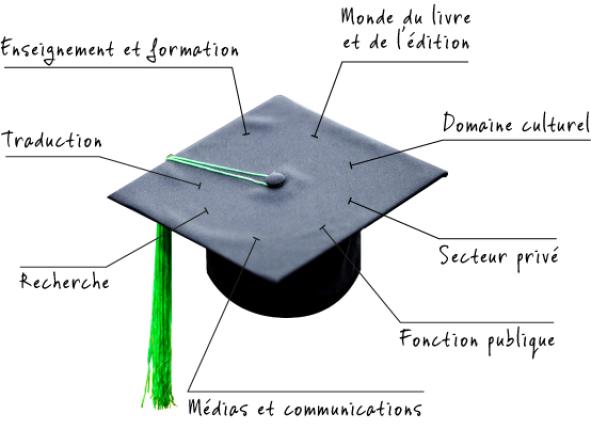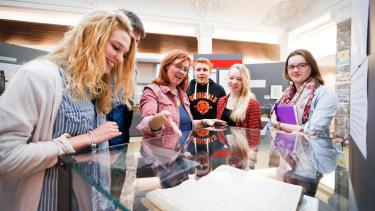Bachelor in Ancient and Modern Languages and Literatures
-
Schedule
regular course
- ECTS Credits 180

From Latin...
No prerequisites are required for Latin training, although a prior basic knowledge is strongly advised. If you have not studied it in secondary school, an introductory course is specially designed for you. If you already have an advanced level, you can go straight into the Reading Texts or Explanation of Latin Authors courses, the latter devoted as much to literary and historical analysis as to the study of the language.
From the first year, you specialize in Latin language. The program includes theory courses, version and theme exercises, linguistic analysis, the study of Latin literature and an introduction to research tools.
To understand the historical and cultural context of Latin literature, a knowledge of antiquity is necessary. You are thus trained in the history, archaeology and art history of Greco-Roman antiquity.
Latin literature having developed essentially on the model of Greek literature, your training also includes learning the foundations of the Greek language. A gradual introduction is provided if you didn't take Greek in secondary school.
... to French
In linguistics, you will learn to analyze and describe the French language in its various aspects (phonology, morphosyntax, semantics) and understand how it has taken shape over the course of history to reach its current state. Practical courses in written and spoken French enable you to acquire the excellent command of the French language essential to these studies.
In literature, you are introduced to the reading and analysis of texts, the history of literary themes and genres, and the study of French and Francophone authors, from the Middle Ages to the Contemporary Era.
Several courses establish bridges between the Latin and French domains, notably through the study of the evolution of Latin into the Romance languages and the older states of the French language.
You're off to a good start
- you have an excellent command of French, particularly spelling;
- you have a real "taste for text" and enjoy close reading;
- you are capable of rigor and precision in analyzing a text;
- you enjoy seeking out information and elaborating complex thought.
Teaching methods

Courses, practical exercises, individual work... everything is done to ensure that you master the Latin and French languages, their history and the cultures they convey.
To learn Latin, you attend classes with a large audience and specialization classes in small groups. The latter are accompanied by regular exercise sessions that gradually train you in version and theme. All exercises are subject to a correction session commented on by the teacher.
The written and spoken French courses include regular exercise sessions. Completing the exercises on offer is a prerequisite for guaranteeing your learning.
The history of Latin and French literature is the subject of theoretical classes, which are supplemented by readings (Latin works in translation, novels, plays, short stories...) and personal analyses.
In 3rd year, you complete a travail de fin de cycle under the direct supervision of a teacher from the Classics, Romance or History department, who guides you in the choice of subject, research and writing. This work prepares you for independent scientific research.
At the end of your bachelor's degree, you'll have the chance to discover a different approach to university teaching and enjoy a cultural and even linguistic experience, thanks to the "Erasmus" program.
Success aids
Succeeding in a year of study at university involves many challenges.
To help you meet them, UNamur supports you in developing your disciplinary, methodological and human skills... with the support of numerous professionals.
Preparatory courses, individualized help... Discover the schemes set up for your training.
After the baccalauréat: the master's degree
The bachelor's degree in ancient and modern languages and literature gives automatic access, in the French Community, to the master's degree in ancient and modern languages and literature.
During this second cycle, you opt for a major that prepares you more specifically for teaching (didactic major), research (in-depth major) or another professional specialization in the field of books, publishing, IT and linguistics, journalism...
-
<unknown>
Code Name Staff Th.+Ex. Credits/Block 1 2 3 LHISB001_P35770 <unknown> Hermand Xavier 15h th. 2 2 -
<unknown>
Code Name Staff Th.+Ex. Credits/Block 1 2 3 LROMB314 Philology: editing of texts Palumbo Giovanni Battista Lecomte Sophie 15h th. 3 3 -
<unknown>
-
<unknown>
Code Name Staff Th.+Ex. Credits/Block 1 2 3 LROMB301 History of French literature De Mulder Caroline 30h th. 4 LROMB317 French modern authors II Vrydaghs David 30h th. 4 LROMB313 Belgian French-language literature De Mulder Caroline 30h th. 4 LROMB303 General Linguistics II Vaxelaire Jean-Louis 30h th. 4 Soft skillsLLETB001 Books and digital culture Leyh Valérie Ruffini-Ronzani Nicolas Pignot Matthieu 30h th. 4 -
<unknown>
Code Name Staff Th.+Ex. Credits/Block 1 2 3 LHISB317 Special palaeography of the medieval period Nieus Jean-François 15h th. 2 LHISB310 Western Palaeography: General Introduction Hermand Xavier 15h th. + 15h ex. 2 LARTB038 Roman antiquity Richard Julian 30h th. 4 LARTB009 Italic and Etruscan Antiquity Richard Julian 30h th. 4 LARTB028 Archaeology and Art History. Contemporary period Leenaerts Danielle 30h th. 4 LARTB012 Archaeology and Art History. Modern times Lefftz Michel 30h th. 4 LARTB011 Archaeology and art history. Middle Ages Piavaux Mathieu 30h th. 4 LCLAB301 Questions of ancient history Flament Christophe 30h th. 4 Soft skillsLHISB002 History of the Contemporary Era Tixhon Axel 30h th. 4 LHISB003 History of Modern Times Delleaux Fulgence 30h th. 4 LHISB004 History of the Middle Ages Hermand Xavier 30h th. 4 Soft skillsLLETB001 Books and digital culture Leyh Valérie Ruffini-Ronzani Nicolas Pignot Matthieu 30h th. 4 -
<unknown>
Code Name Staff Th.+Ex. Credits/Block 1 2 3 Soft skillsLELVB001 English 2 (level B1 or higher) Labate Simon 60h th. 4 LALLB001 Reading of German texts I Vanoirbeek Fabienne 30h th. 4 LROMB102 Spanish I François Jéromine 15h th. + 60h ex. 8 LROMB103 Italian I Palumbo Giovanni Battista 15h th. + 60h ex. 8
-
-
<unknown>
Code Name Staff Th.+Ex. Credits/Block 1 2 3 LROMB231 Historical linguistics of French and Romance languages Vaxelaire Jean-Louis Palumbo Giovanni Battista 45h th. 5 Soft skillsLROMB219 Written French Practices II SINTE Aurélie SINTE Aurélie 30h th. 4 -
<unknown>
Code Name Staff Th.+Ex. Credits/Block 1 2 3 LROMB310 Moyen français : lectures et commentaires de textes Palumbo Giovanni Battista Lecomte Sophie 30h th. 4 -
<unknown>
Code Name Staff Th.+Ex. Credits/Block 1 2 3 LROMB301 History of French literature De Mulder Caroline 30h th. 4 LROMB317 French modern authors II Vrydaghs David 30h th. 4
-
-
<unknown>
Code Name Staff Th.+Ex. Credits/Block 1 2 3 LCLAB205 Latin Language II Fontaine Elise 30h th. + 90h ex. 12 LCLAB306 Latin Language III Fontaine Elise 30h th. + 90h ex. 12 LCLAB102 Latin Language I Assenmaker Pierre 30h th. + 75h ex. 12 LHISB202 Translation of medieval Latin texts I Hermand Xavier 30h th. 3 LHISB316 Translation of medieval Latin texts II Nieus Jean-François Hermand Xavier Pignot Matthieu 30h th. 3 LCLAB003 Explanation of Latin authors A Assenmaker Pierre 30h th. 3 3 3 LCLAB011 Explanation of Latin authors B Assenmaker Pierre 30h th. 3 3 3 LCLAB012 Explanation of Latin authors C Assenmaker Pierre 30h th. 3 3 3 -
<unknown>
Code Name Staff Th.+Ex. Credits/Block 1 2 3 LCLAB009 Introduction to the Latin language Assenmaker Pierre 45h th. + 15h ex. 3 LCLAB007 Reading of Latin texts Assenmaker Pierre 45h th. 3 3 LCLAB003 Explanation of Latin authors A Assenmaker Pierre 30h th. 3 3 3 LCLAB011 Explanation of Latin authors B Assenmaker Pierre 30h th. 3 3 3 LCLAB012 Explanation of Latin authors C Assenmaker Pierre 30h th. 3 3 3
-
-
<unknown>
Code Name Staff Th.+Ex. Credits/Block 1 2 3 LARTB111 Archaeology and Art history : Greek and Roman Antiquity Richard Julian 30h th. 3 LCLAB101 History of Antiquity Flament Christophe Liard Florence 45h th. 4 Soft skillsLCLAB212 Heuristics of Antiquity Flament Christophe 30h th. 3 LCLAB307 Tools and methods of Latin philology Fontaine Elise 30h th. 3 LCLAB006 Explanation of Greek authors A 45h th. 3 3 3 LCLAB013 Explanation of Greek authors Fontaine Elise 45h th. 3 3 3 LCLAB014 Explanation of Greek authors C 45h th. 3 3 3 -
<unknown>
Code Name Staff Th.+Ex. Credits/Block 1 2 3 LCLAB004 Introduction to the Greek language Obsomer Claude 45h th. + 15h ex. 3 LCLAB005 Reading of Greek texts Obsomer Claude 45h th. 3 3 LCLAB006 Explanation of Greek authors A 45h th. 3 3 3 LCLAB013 Explanation of Greek authors Fontaine Elise 45h th. 3 3 3 LCLAB014 Explanation of Greek authors C 45h th. 3 3 3
-
-
<unknown>
Code Name Staff Th.+Ex. Credits/Block 1 2 3 LHISB101 Religious Studies Hermans Michel 30h th. 3 LPHIB105 General introduction to philosophy Monseu-Van Cleemput Nicolas De Meyer Thibault De Meyer Thibault 45h th. 4 -
<unknown>
Code Name Staff Th.+Ex. Credits/Block 1 2 3 LROMB123 History of the French language and its grammatical norms Vaxelaire Jean-Louis SINTE Aurélie 30h th. 4 LROMB117 Practice of written French I SINTE Aurélie SINTE Aurélie 30h th. 5 LROMB104 Synchronic Linguistics of Modern French I Vaxelaire Jean-Louis 30h th. + 30h ex. 5 -
<unknown>
Code Name Staff Th.+Ex. Credits/Block 1 2 3 LROMB309 Linguistique romane et histoire des langues romanes Palumbo Giovanni Battista 30h th. 4 LROMB218 General Linguistics I Vaxelaire Jean-Louis 30h th. + 15h ex. 5 -
<unknown>
Code Name Staff Th.+Ex. Credits/Block 1 2 3 LROMB228 Theory of literature Vrydaghs David 30h th. 4 LROMB327 Explanations by modern and contemporary French authors Vrydaghs David 30h th. 4 LROMB233 Literary analysis Vrydaghs David Saint-Amand Denis 30h th. 4 LROMB330 Explanation of French texts from the Middle Ages (Middle French) Palumbo Giovanni Battista Lecomte Sophie 30h th. 5 LROMB229 Explanation of French texts from the Middle Ages (Old French) Palumbo Giovanni Battista 30h th. 5 LLETB002 History of ancient literature and its legacies Minet Mathieu 30h th. 4 LROMB109 History of French Literature I Vrydaghs David Saint-Amand Denis 30h th. 5 LROMB124 History of French literature (19th-21st century) Saint-Amand Denis Vrydaghs David 30h th. 5 LCLAB209 History of Latin literature Assenmaker Pierre 45h th. 4 -
<unknown>
Code Name Staff Th.+Ex. Credits/Block 1 2 3 LCLAB308 End of cycle work Assenmaker Pierre 7
-
<unknown>
Code Name Staff Credits Hours/Quarter 1 2 LCLAB102 Latin Language I Assenmaker Pierre 12 30h ex. 30h th. + 45h ex. -
<unknown>
Code Name Staff Credits Hours/Quarter 1 2 LCLAB009 Introduction to the Latin language Assenmaker Pierre 3 22.5h th. + 7.5h ex. 22.5h th. + 7.5h ex. LCLAB007 Reading of Latin texts Assenmaker Pierre 3 30h th. 15h th. LCLAB003 Explanation of Latin authors A Assenmaker Pierre 3 30h th. LCLAB011 Explanation of Latin authors B Assenmaker Pierre 3 30h th. LCLAB012 Explanation of Latin authors C Assenmaker Pierre 3 30h th.
-
-
<unknown>
Code Name Staff Credits Hours/Quarter 1 2 LARTB111 Archaeology and Art history : Greek and Roman Antiquity Richard Julian 3 30h th. LCLAB101 History of Antiquity Flament Christophe Liard Florence 4 45h th. -
<unknown>
Code Name Staff Credits Hours/Quarter 1 2 LCLAB004 Introduction to the Greek language Obsomer Claude 3 22.5h th. + 7.5h ex. 22.5h th. + 7.5h ex. LCLAB005 Reading of Greek texts Obsomer Claude 3 22.5h th. 22.5h th. LCLAB006 Explanation of Greek authors A 3 30h th. 15h th. LCLAB013 Explanation of Greek authors Fontaine Elise 3 30h th. 15h th. LCLAB014 Explanation of Greek authors C 3 30h th. 15h th.
-
-
<unknown>
Code Name Staff Credits Hours/Quarter 1 2 LHISB101 Religious Studies Hermans Michel 3 30h th. LPHIB105 General introduction to philosophy Monseu-Van Cleemput Nicolas De Meyer Thibault De Meyer Thibault 4 22.5h th. 22.5h th. -
<unknown>
Code Name Staff Credits Hours/Quarter 1 2 LROMB123 History of the French language and its grammatical norms Vaxelaire Jean-Louis SINTE Aurélie 4 30h th. LROMB117 Practice of written French I SINTE Aurélie SINTE Aurélie 5 30h th. LROMB104 Synchronic Linguistics of Modern French I Vaxelaire Jean-Louis 5 30h th. + 30h ex. -
<unknown>
Code Name Staff Credits Hours/Quarter 1 2 LLETB002 History of ancient literature and its legacies Minet Mathieu 4 30h th. LROMB109 History of French Literature I Vrydaghs David Saint-Amand Denis 5 30h th. LROMB124 History of French literature (19th-21st century) Saint-Amand Denis Vrydaghs David 5 30h th.
-
<unknown>
Code Name Staff Credits Hours/Quarter 1 2 LHISB001_P35770 <unknown> Hermand Xavier 2 15h th. -
<unknown>
Code Name Staff Credits Hours/Quarter 1 2 LROMB314 Philology: editing of texts Palumbo Giovanni Battista Lecomte Sophie 3 15h th. -
<unknown>
Code Name Staff Credits Hours/Quarter 1 2 LROMB231 Historical linguistics of French and Romance languages Vaxelaire Jean-Louis Palumbo Giovanni Battista 5 45h th. Soft skillsLROMB219 Written French Practices II SINTE Aurélie SINTE Aurélie 4 30h th. -
<unknown>
Code Name Staff Credits Hours/Quarter 1 2 LCLAB205 Latin Language II Fontaine Elise 12 15h th. + 45h ex. 15h th. + 45h ex. LHISB202 Translation of medieval Latin texts I Hermand Xavier 3 15h th. 15h th. -
<unknown>
Code Name Staff Credits Hours/Quarter 1 2 LCLAB007 Reading of Latin texts Assenmaker Pierre 3 30h th. 15h th. LCLAB003 Explanation of Latin authors A Assenmaker Pierre 3 30h th. LCLAB011 Explanation of Latin authors B Assenmaker Pierre 3 30h th. LCLAB012 Explanation of Latin authors C Assenmaker Pierre 3 30h th.
-
-
<unknown>
Code Name Staff Credits Hours/Quarter 1 2 Soft skillsLCLAB212 Heuristics of Antiquity Flament Christophe 3 30h th. -
<unknown>
Code Name Staff Credits Hours/Quarter 1 2 LCLAB005 Reading of Greek texts Obsomer Claude 3 22.5h th. 22.5h th. LCLAB006 Explanation of Greek authors A 3 30h th. 15h th. LCLAB013 Explanation of Greek authors Fontaine Elise 3 30h th. 15h th. LCLAB014 Explanation of Greek authors C 3 30h th. 15h th.
-
-
<unknown>
Code Name Staff Credits Hours/Quarter 1 2 LROMB218 General Linguistics I Vaxelaire Jean-Louis 5 30h th. + 15h ex. -
<unknown>
Code Name Staff Credits Hours/Quarter 1 2 LROMB228 Theory of literature Vrydaghs David 4 30h th. LROMB327 Explanations by modern and contemporary French authors Vrydaghs David 4 30h th. LROMB233 Literary analysis Vrydaghs David Saint-Amand Denis 4 30h th. LROMB330 Explanation of French texts from the Middle Ages (Middle French) Palumbo Giovanni Battista Lecomte Sophie 5 30h th. LROMB229 Explanation of French texts from the Middle Ages (Old French) Palumbo Giovanni Battista 5 30h th. LCLAB209 History of Latin literature Assenmaker Pierre 4 22.5h th. 22.5h th.
-
<unknown>
Code Name Staff Credits Hours/Quarter 1 2 LHISB001_P35770 <unknown> Hermand Xavier 2 15h th. -
<unknown>
Code Name Staff Credits Hours/Quarter 1 2 LROMB314 Philology: editing of texts Palumbo Giovanni Battista Lecomte Sophie 3 15h th. -
<unknown>
-
<unknown>
Code Name Staff Credits Hours/Quarter 1 2 LROMB301 History of French literature 4 30h th. LROMB317 French modern authors II 4 30h th. LROMB313 Belgian French-language literature De Mulder Caroline 4 30h th. LROMB303 General Linguistics II Vaxelaire Jean-Louis 4 30h th. LLETB001 Books and digital culture 4 30h th. -
<unknown>
Code Name Staff Credits Hours/Quarter 1 2 LHISB317 Special palaeography of the medieval period Nieus Jean-François 2 15h th. LHISB310 Western Palaeography: General Introduction Hermand Xavier 2 15h th. + 15h ex. LARTB038 Roman antiquity Richard Julian 4 30h th. LARTB009 Italic and Etruscan Antiquity Richard Julian 4 30h th. LARTB028 Archaeology and Art History. Contemporary period Leenaerts Danielle 4 30h th. LARTB012 Archaeology and Art History. Modern times Lefftz Michel 4 30h th. LARTB011 Archaeology and art history. Middle Ages Piavaux Mathieu 4 30h th. LCLAB301 Questions of ancient history Flament Christophe 4 30h th. Soft skillsLHISB002 History of the Contemporary Era Tixhon Axel 4 30h th. LHISB003 History of Modern Times Delleaux Fulgence 4 30h th. LHISB004 History of the Middle Ages Hermand Xavier 4 30h th. Soft skillsLLETB001 Books and digital culture Leyh Valérie Ruffini-Ronzani Nicolas Pignot Matthieu 4 30h th. -
<unknown>
Code Name Staff Credits Hours/Quarter 1 2 Soft skillsLELVB001 English 2 (level B1 or higher) Labate Simon 4 30h th. 30h th. LALLB001 Reading of German texts I Vanoirbeek Fabienne 4 30h th. LROMB102 Spanish I François Jéromine 8 7h th. + 30h ex. 8h th. + 30h ex. LROMB103 Italian I Palumbo Giovanni Battista 8 7h th. + 30h ex. 8h th. + 30h ex.
-
-
<unknown>
Code Name Staff Credits Hours/Quarter 1 2 LROMB310 Moyen français : lectures et commentaires de textes Palumbo Giovanni Battista Lecomte Sophie 4 30h th. -
<unknown>
Code Name Staff Credits Hours/Quarter 1 2 LROMB301 History of French literature De Mulder Caroline 4 30h th. LROMB317 French modern authors II Vrydaghs David 4 30h th.
-
-
<unknown>
Code Name Staff Credits Hours/Quarter 1 2 LCLAB306 Latin Language III Fontaine Elise 12 15h th. + 45h ex. 15h th. + 45h ex. LHISB316 Translation of medieval Latin texts II Nieus Jean-François Hermand Xavier Pignot Matthieu 3 15h th. 15h th. LCLAB003 Explanation of Latin authors A Assenmaker Pierre 3 30h th. LCLAB011 Explanation of Latin authors B Assenmaker Pierre 3 30h th. LCLAB012 Explanation of Latin authors C Assenmaker Pierre 3 30h th. -
<unknown>
Code Name Staff Credits Hours/Quarter 1 2 LCLAB307 Tools and methods of Latin philology Fontaine Elise 3 15h th. 15h th. LCLAB006 Explanation of Greek authors A 3 30h th. 15h th. LCLAB013 Explanation of Greek authors Fontaine Elise 3 30h th. 15h th. LCLAB014 Explanation of Greek authors C 3 30h th. 15h th. -
<unknown>
Code Name Staff Credits Hours/Quarter 1 2 LROMB309 Linguistique romane et histoire des langues romanes Palumbo Giovanni Battista 4 30h th. -
<unknown>
Code Name Staff Credits Hours/Quarter 1 2 LCLAB308 End of cycle work Assenmaker Pierre 7

Professions of French-Latin experts
Although graduates in ancient and modern languages and literature are very often destined for the profession of Latin and French teacher, they can put their skills to good use in many other, sometimes unexpected, professional fields.
Teaching and training
Many graduates share their expertise and passion for Latin and French with secondary school students.
But many also intervene in other training contexts facing a variety of audiences. We find them in Hautes Écoles, in private language centers, in continuing education organizations, in associations active in socio-professional integration or sometimes within certain large companies.
Within the framework of bilateral agreements signed by the Wallonia-Brussels Federation, the WBI (Wallonia-Brussels International, the public administration in charge of international relations) coordinates a network of French language trainers in several European countries and even in Louisiana. Dozens of young graduates thus spend a few years abroad as readers of
French language and literature in a university or a school of translators-interpreters, as trainers in a bilingual lycée, or as French language assistants in a secondary school, helping to promote Belgium's French culture in the broadest sense (literature, history, institutional system...).
Cultural and publishing world
The full range of book professions is available to graduates in ancient and modern languages and literature, from proofreading to publishing house management, promotion or literary translation.
These professions can be found in publishing houses, libraries, bookshops, documentation centers or as freelancers. Thanks to their training, which is open to the major artistic trends, graduates can also manage cultural projects in institutions such as Maisons de la culture, theaters...
Media and communication
By opening up to the socio-economic world or specializing in a particular cultural field, graduates can put their skills to work in the media and communication and become journalists, literary critics, editors in corporate
newspapers, press attachés, project managers in advertising...
Scientific research
Some graduates pursue a research activity, often complemented by teaching duties, in Belgium and sometimes abroad. Universities and public funds (e.g. FNRS) can finance the completion of a PhD. Doctors of philosophy and humanities then have the opportunity to teach at university.
Graduates in ancient and modern languages and literature will be able to direct their research in various fields: linguistics (mainly historical), Latin, Neolatin or French literature, cultural history, from Antiquity to the present day. Their skills are particularly well recognized in the study of the Renaissance and Modern Times, which relies to a very large extent on abundant Latin documentation that is still very rarely translated...
A social life to develop
When it comes to landing a first job, candidates' personalities are often as important as their university degrees, hence the importance of keeping one's curiosity alive throughout one's studies, and building a rich social life, for example by getting involved in the associative world. Young graduates can expect to follow a sometimes winding career path, especially in the first few years...
But it's often in these detours that creative, curious personalities and those driven by an entrepreneurial spirit will discover the profession they're passionate about. Some graduates complement their studies with further training (communication, languages, IT, management, etc.), which can facilitate their professional integration in specialized business sectors.
